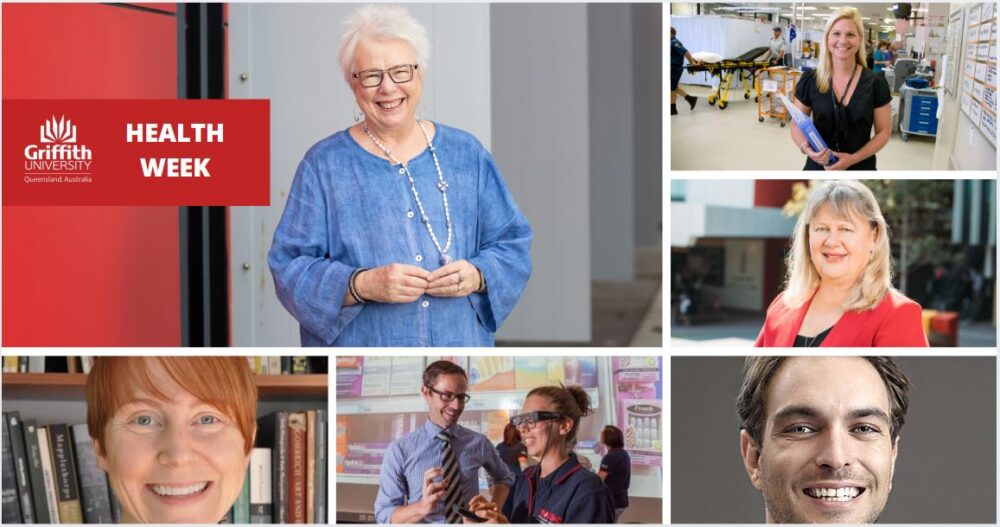Ever wondered where your career in health care might take you? Seeking advice on how to start your career? We recently brought together Griffith Health experts in a virtual event to talk to us about health careers with amazing social impact opportunities, such as environmental health, workplace mental health, and human services. Read on for a snapshot of their conversation.
If you’d like to build a career in health but you’re not sure where you’d like to work, our panelists highlighted a range of innovative career options where they expect to see growth in the next five years – the perfect place to build or start your career in health!
Gary Grant, a Griffith Expert with an interest in pharmacy, pharmacology, antibiotics resistance and infectious diseases, expects to see greater development of interdisciplinary healthcare teams – and says a pharmacist should be part of that.
“I think one of the key features of moving forward in healthcare is to get pharmacists more embedded in multidisciplinary teams and see how professions working together can lead to much better outcomes for the community and for patients,” says Gary.
“How we harness technology to facilitate that is going to be one of the enablers to connect professions together for people. And I think even in this current time where we see the use of telehealth to support people for medical needs is an illustration now that we have the technology available, we just need to now learn how to harness that in a more collaborative approach for multidisciplinary care.”
Exercise Physiologist Nick Steel, from the Griffith Health Clinics, echoes the same thoughts as Gary, saying that interdisciplinary teams and technology are already making greater changes for healthcare providers in exercise physiology and physiotherapy.
“We’ve seen so many hospitals and healthcare settings already move in that direction where a team of health professionals will meet to discuss certain cases and how to best manage and treat that client to ensure optimal outcomes are met for all parties. And that is that ultimate holistic approach to client care,” he says.
“One area I see growth in as a practitioner is in rural areas. I feel telehealth will be a treatment option that will most likely become the norm in the future of healthcare, and that will really be of benefit to those in rural and remote areas, housebound individuals, people that face other social and environmental impacts or constraints that stop them from being able to attend appointments. That’s definitely a change coming through with the future of healthcare within our scope of practice.”
Julia Crilly, a registered nurse and Griffith researcher says we can expect to see the health needs of the caregiver be taken into greater account, particularly for those working in areas of national priority.
“The future of healthcare in my particular area around emergency nursing, will be on how we best deliver care for older people and people with mental health problems, but also how can we ensure the nurses and the doctors on the front line have the strategies to cope with the stressful situations that they are faced with on a daily basis,” she says.
“Nursing has changed so much in the last five to ten years, particularly in terms of the opportunities to progress a career in nursing. It’s not limited now to shift work management or education. There are so many opportunities now with research, project management, nurse practitioner, and nurse navigators, just to name a few.
“The fundamental aspects of nursing remain the same though – you still need to be able to think critically, to provide comfort and communication to the patient and their family and between professional groups as well.”
Environmental health expert Anne Roiko expects to see opportunities in the health technology space, saying that digital technologies are “changing everything”, leading to exciting opportunities for graduates.
“Our knowledge about the microbiome and metagenomics and artificial intelligence is opening up a whole new world and changing the way we think about how pathogens invade our bodies and the interactions between chemicals and microbes,” Anne explains.
“We’re able to add layer after layer of the social dimensions of diseases and the long-term impacts they have on a community through rapid, real time monitoring. So the future will see innovative, new digital interfaces and early warning systems, and it just really stresses the need for complex systems thinking and tools that support complex systems thinking.”
Social Work practitioner and Griffith Expert Jenny Boddy expects similar changes in the fields of social work and human services, with big data opening up opportunities to tackle larger, societal problems.
“I think we’ll be harnessing artificial intelligence (AI) and big data in health and social services to tackle some of the global problems that we’re facing around poverty, violence, climate change and so on, but also thinking how we use AI to better service communities and provide services to people,” she says.
“Social workers have historically been a bit resistant to technology, but I think that’s shifting, and I think that’s really exciting what we can do in that space. And one of the other major areas where there’s going to be continued growth is thinking about how we work in interdisciplinary teams to tackle some of these big issues as well – I think that will go hand in hand with the use of big data and AI.”



